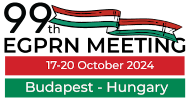Effects of adding early cooperation and a work-place dialogue meeting to primary care management for sick-listed patients with stress-related disorders: CO-WORK-CARE-Stress - a pragmatic cluster randomised controlled trial.
Ausra Saxvik
Keywords: Adjustment disorder/exhaustion disorderstress-related mental disorderrandomised controlled trialcare managerrehabilitation coordinatorprimary caredays on sick-leave
Background:
To investigate whether intensified cooperation between general practitioner (GP), care manager and rehabilitation coordinator (RC) for patients sick-listed for stress-related mental disorder, combined with a person-centred dialogue meeting with employer, could reduce sick-leave days compared with usual care manager contact.
Research questions:
The aim was to investigate whether a structured intervention combining early cooperation between care manager, GP and rehabilitation coordinator combined with a person-centred workplace dialogue meeting led to earlier return to work and fewer net and gross sick-leave days over 12 months period in recently sick-listed patients with adjustment disorder/exhaustion disorder. The intervention was compared with the usual collaborative care manager organisation care
Method:
Pragmatic cluster-randomised controlled trial, randomisation at primary care centre (PCC) level. PCCs in Region Västra Götaland, Sweden, with care manager organisation. Cooperation between GP, care manager and rehabilitation coordinator from start of illness notification plus a person-centred dialogue meeting between patient and employer within 3 months. Regular contact with care manager was continued at the control PCCs.
Results:
There were no significant differences between intervention and control groups after 12 months: days on sick-leave (12-months net sick-leave days, intervention, mean = 110.7 days (95% confidence interval (CI) 82.6 − 138.8); control, mean = 99.1 days (95% CI 73.9 − 124.3)), stress, depression, or anxiety symptoms, work ability or EQ-5D. There were no significant differences between intervention and control groups concerning proportion on sick-leave after 3, 6, 12 months. At 3 months 64.8% were on sick-leave in intervention group vs 54.3% in control group; 6 months 38% vs 32.8%, and12 months 16.9% vs 15.5%.
Conclusions:
Increased cooperation at the PCC between GP, care manager and RC for stress-related mental disorder coupled with an early workplace contact in the form of a person-centred dialogue meeting does not reduce days of sick-leave or speed up rehabilitation.
Points for discussion:
How works cooperation at PCC in your country?
What insurance system do you have?
Do you have a specialised nurse at PCC?
#3

